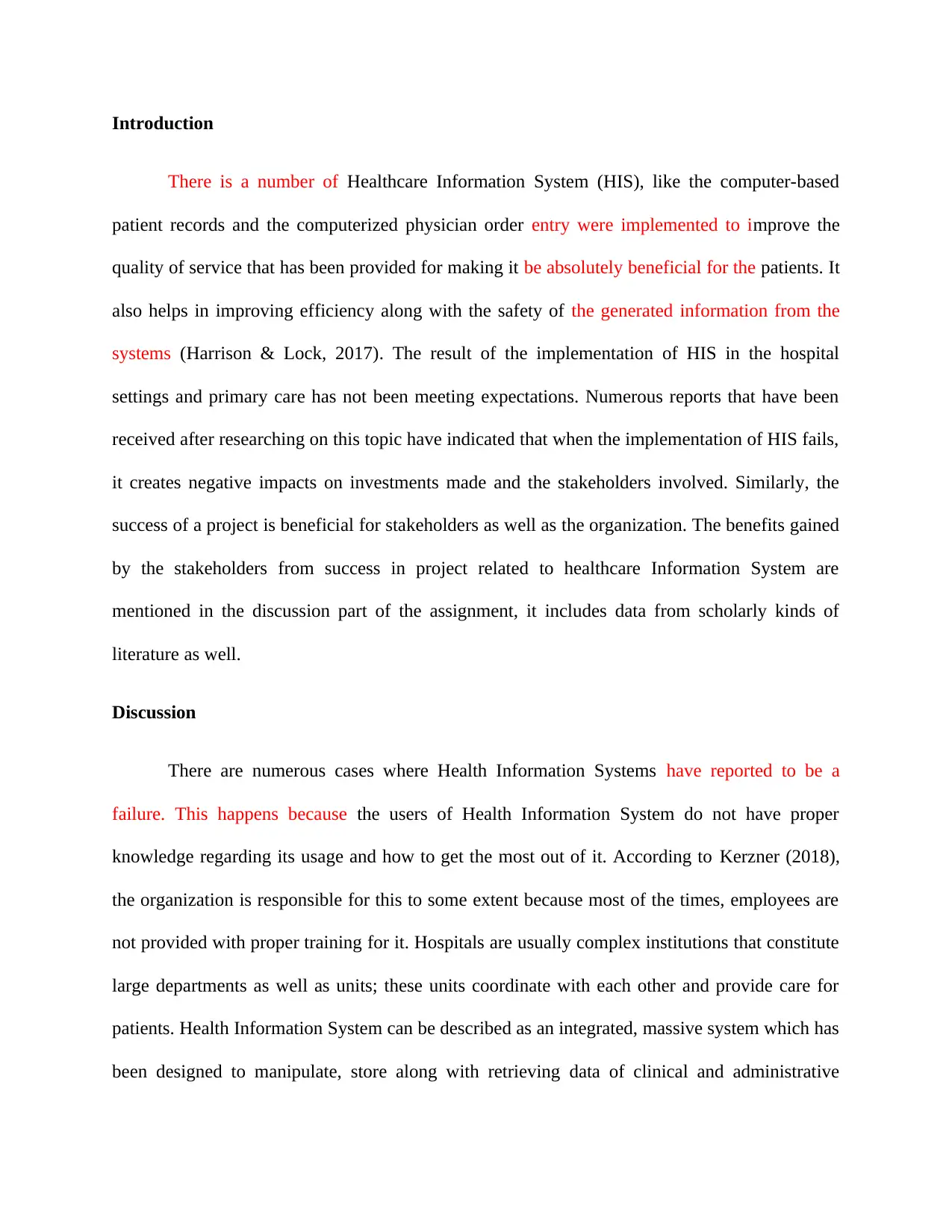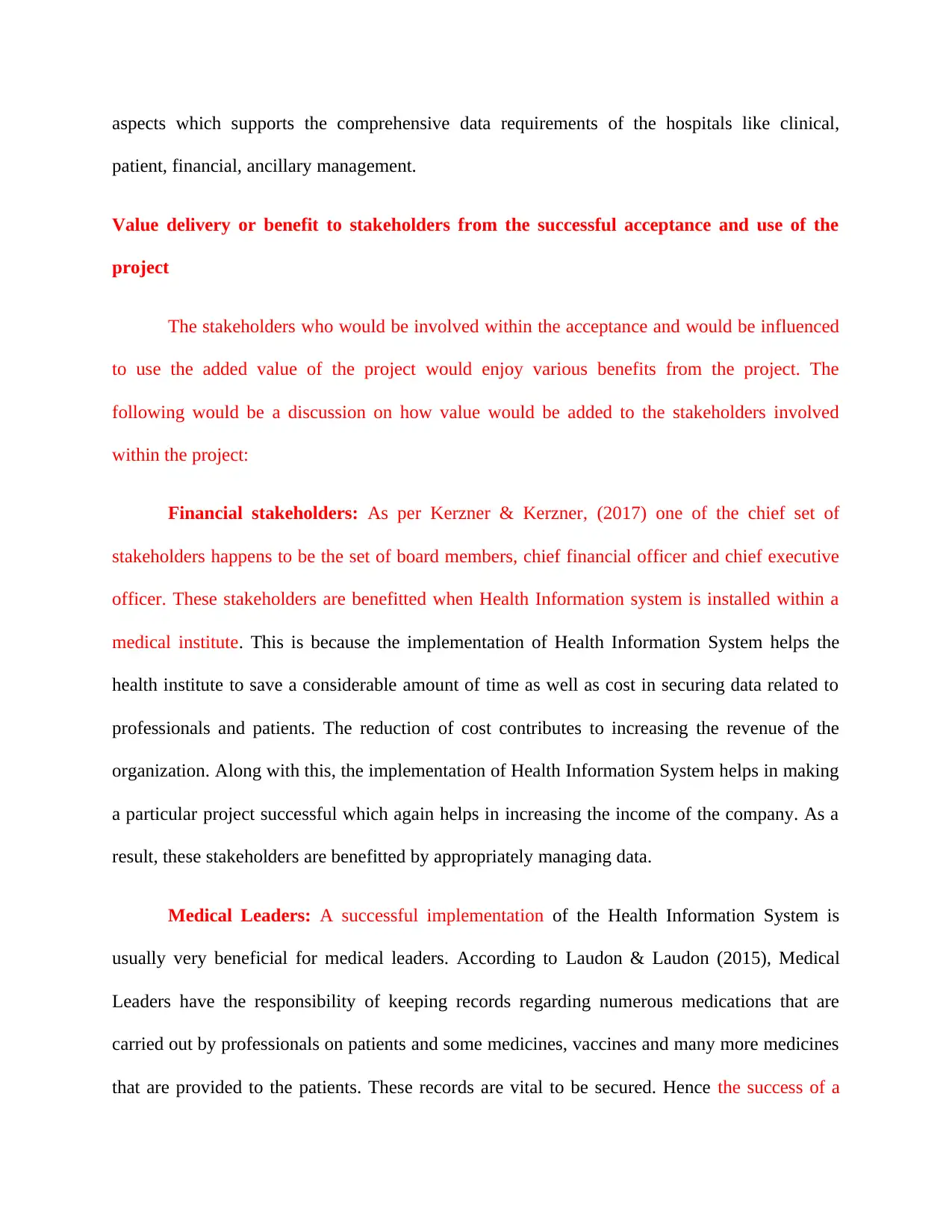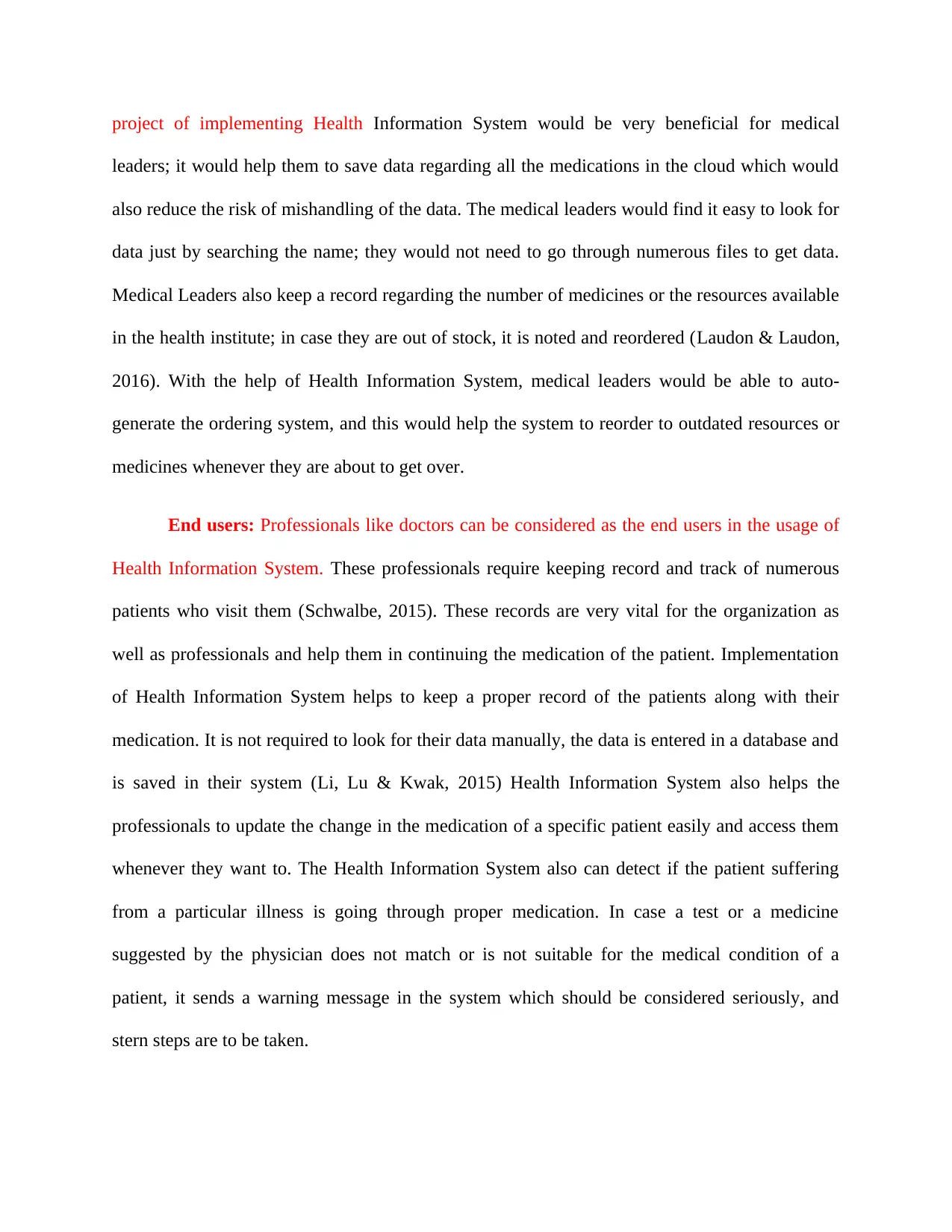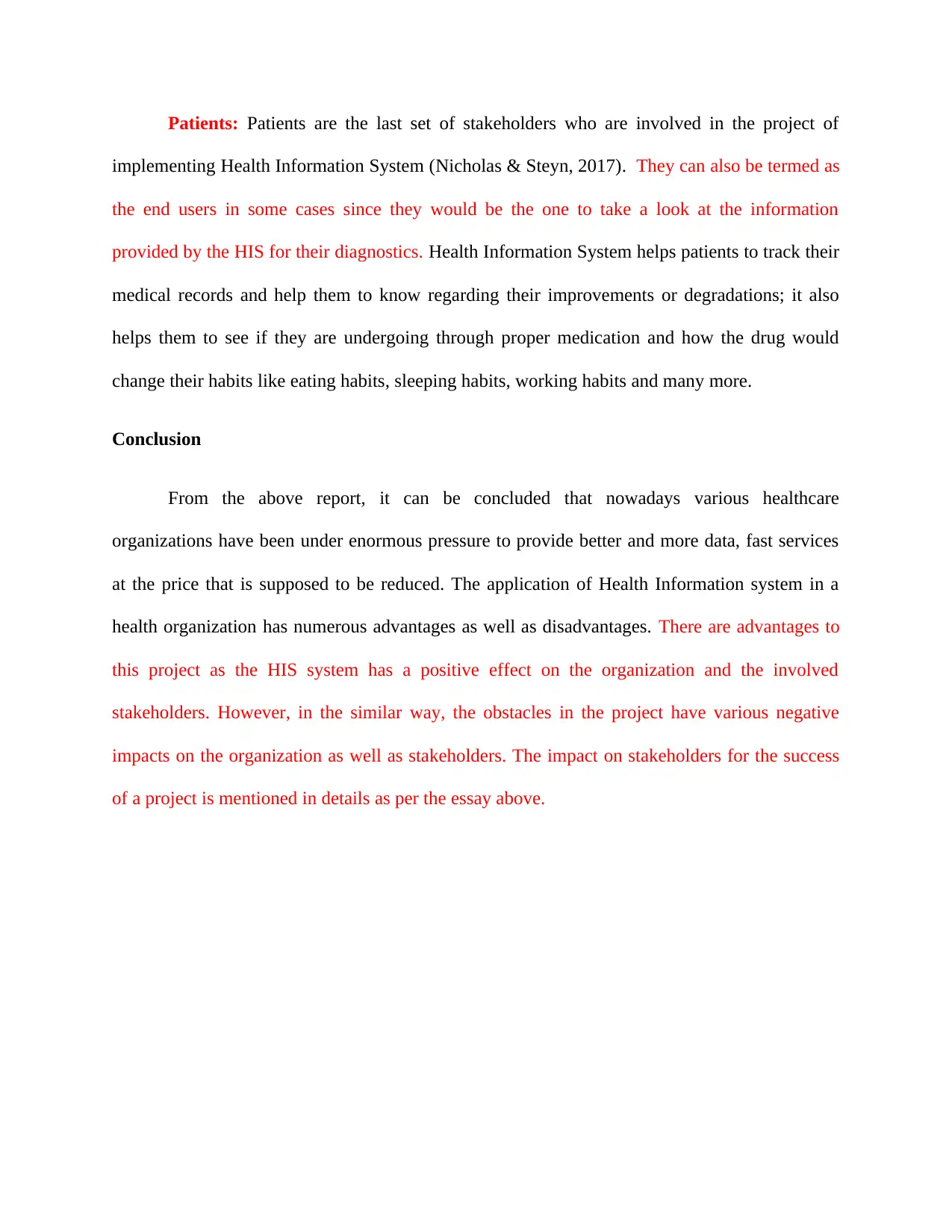Information System Project Management: Stakeholder Value in Healthcare
VerifiedAdded on 2023/04/21
|6
|1434
|58
Report
AI Summary
This report explores the critical aspects of Healthcare Information System (HIS) project management, emphasizing the importance of successful implementation and its impact on various stakeholders. It highlights that while HIS implementations aim to improve service quality, efficiency, and safety, failures can lead to negative consequences for investments and stakeholders. The discussion focuses on how successful HIS projects deliver value to financial stakeholders (board members, CFOs, CEOs) through cost and time savings, to medical leaders by securing medication records and automating reordering systems, to end-users (doctors) by streamlining patient record management and providing decision support, and to patients by enabling them to track their medical records and understand their treatment plans. The report concludes that healthcare organizations face increasing pressure to provide better, faster, and more data-driven services, making the successful application of HIS crucial, despite potential obstacles, for both the organization and its stakeholders.

Running head: INFORMATION SYSTEM PROJECT MANAGEMENT
INFORMATION SYSTEM PROJECT MANAGEMENT
Name of Student
Name of University
Author’s Note
INFORMATION SYSTEM PROJECT MANAGEMENT
Name of Student
Name of University
Author’s Note
Paraphrase This Document
Need a fresh take? Get an instant paraphrase of this document with our AI Paraphraser

Introduction
There is a number of Healthcare Information System (HIS), like the computer-based
patient records and the computerized physician order entry were implemented to improve the
quality of service that has been provided for making it be absolutely beneficial for the patients. It
also helps in improving efficiency along with the safety of the generated information from the
systems (Harrison & Lock, 2017). The result of the implementation of HIS in the hospital
settings and primary care has not been meeting expectations. Numerous reports that have been
received after researching on this topic have indicated that when the implementation of HIS fails,
it creates negative impacts on investments made and the stakeholders involved. Similarly, the
success of a project is beneficial for stakeholders as well as the organization. The benefits gained
by the stakeholders from success in project related to healthcare Information System are
mentioned in the discussion part of the assignment, it includes data from scholarly kinds of
literature as well.
Discussion
There are numerous cases where Health Information Systems have reported to be a
failure. This happens because the users of Health Information System do not have proper
knowledge regarding its usage and how to get the most out of it. According to Kerzner (2018),
the organization is responsible for this to some extent because most of the times, employees are
not provided with proper training for it. Hospitals are usually complex institutions that constitute
large departments as well as units; these units coordinate with each other and provide care for
patients. Health Information System can be described as an integrated, massive system which has
been designed to manipulate, store along with retrieving data of clinical and administrative
There is a number of Healthcare Information System (HIS), like the computer-based
patient records and the computerized physician order entry were implemented to improve the
quality of service that has been provided for making it be absolutely beneficial for the patients. It
also helps in improving efficiency along with the safety of the generated information from the
systems (Harrison & Lock, 2017). The result of the implementation of HIS in the hospital
settings and primary care has not been meeting expectations. Numerous reports that have been
received after researching on this topic have indicated that when the implementation of HIS fails,
it creates negative impacts on investments made and the stakeholders involved. Similarly, the
success of a project is beneficial for stakeholders as well as the organization. The benefits gained
by the stakeholders from success in project related to healthcare Information System are
mentioned in the discussion part of the assignment, it includes data from scholarly kinds of
literature as well.
Discussion
There are numerous cases where Health Information Systems have reported to be a
failure. This happens because the users of Health Information System do not have proper
knowledge regarding its usage and how to get the most out of it. According to Kerzner (2018),
the organization is responsible for this to some extent because most of the times, employees are
not provided with proper training for it. Hospitals are usually complex institutions that constitute
large departments as well as units; these units coordinate with each other and provide care for
patients. Health Information System can be described as an integrated, massive system which has
been designed to manipulate, store along with retrieving data of clinical and administrative

aspects which supports the comprehensive data requirements of the hospitals like clinical,
patient, financial, ancillary management.
Value delivery or benefit to stakeholders from the successful acceptance and use of the
project
The stakeholders who would be involved within the acceptance and would be influenced
to use the added value of the project would enjoy various benefits from the project. The
following would be a discussion on how value would be added to the stakeholders involved
within the project:
Financial stakeholders: As per Kerzner & Kerzner, (2017) one of the chief set of
stakeholders happens to be the set of board members, chief financial officer and chief executive
officer. These stakeholders are benefitted when Health Information system is installed within a
medical institute. This is because the implementation of Health Information System helps the
health institute to save a considerable amount of time as well as cost in securing data related to
professionals and patients. The reduction of cost contributes to increasing the revenue of the
organization. Along with this, the implementation of Health Information System helps in making
a particular project successful which again helps in increasing the income of the company. As a
result, these stakeholders are benefitted by appropriately managing data.
Medical Leaders: A successful implementation of the Health Information System is
usually very beneficial for medical leaders. According to Laudon & Laudon (2015), Medical
Leaders have the responsibility of keeping records regarding numerous medications that are
carried out by professionals on patients and some medicines, vaccines and many more medicines
that are provided to the patients. These records are vital to be secured. Hence the success of a
patient, financial, ancillary management.
Value delivery or benefit to stakeholders from the successful acceptance and use of the
project
The stakeholders who would be involved within the acceptance and would be influenced
to use the added value of the project would enjoy various benefits from the project. The
following would be a discussion on how value would be added to the stakeholders involved
within the project:
Financial stakeholders: As per Kerzner & Kerzner, (2017) one of the chief set of
stakeholders happens to be the set of board members, chief financial officer and chief executive
officer. These stakeholders are benefitted when Health Information system is installed within a
medical institute. This is because the implementation of Health Information System helps the
health institute to save a considerable amount of time as well as cost in securing data related to
professionals and patients. The reduction of cost contributes to increasing the revenue of the
organization. Along with this, the implementation of Health Information System helps in making
a particular project successful which again helps in increasing the income of the company. As a
result, these stakeholders are benefitted by appropriately managing data.
Medical Leaders: A successful implementation of the Health Information System is
usually very beneficial for medical leaders. According to Laudon & Laudon (2015), Medical
Leaders have the responsibility of keeping records regarding numerous medications that are
carried out by professionals on patients and some medicines, vaccines and many more medicines
that are provided to the patients. These records are vital to be secured. Hence the success of a
⊘ This is a preview!⊘
Do you want full access?
Subscribe today to unlock all pages.

Trusted by 1+ million students worldwide

project of implementing Health Information System would be very beneficial for medical
leaders; it would help them to save data regarding all the medications in the cloud which would
also reduce the risk of mishandling of the data. The medical leaders would find it easy to look for
data just by searching the name; they would not need to go through numerous files to get data.
Medical Leaders also keep a record regarding the number of medicines or the resources available
in the health institute; in case they are out of stock, it is noted and reordered (Laudon & Laudon,
2016). With the help of Health Information System, medical leaders would be able to auto-
generate the ordering system, and this would help the system to reorder to outdated resources or
medicines whenever they are about to get over.
End users: Professionals like doctors can be considered as the end users in the usage of
Health Information System. These professionals require keeping record and track of numerous
patients who visit them (Schwalbe, 2015). These records are very vital for the organization as
well as professionals and help them in continuing the medication of the patient. Implementation
of Health Information System helps to keep a proper record of the patients along with their
medication. It is not required to look for their data manually, the data is entered in a database and
is saved in their system (Li, Lu & Kwak, 2015) Health Information System also helps the
professionals to update the change in the medication of a specific patient easily and access them
whenever they want to. The Health Information System also can detect if the patient suffering
from a particular illness is going through proper medication. In case a test or a medicine
suggested by the physician does not match or is not suitable for the medical condition of a
patient, it sends a warning message in the system which should be considered seriously, and
stern steps are to be taken.
leaders; it would help them to save data regarding all the medications in the cloud which would
also reduce the risk of mishandling of the data. The medical leaders would find it easy to look for
data just by searching the name; they would not need to go through numerous files to get data.
Medical Leaders also keep a record regarding the number of medicines or the resources available
in the health institute; in case they are out of stock, it is noted and reordered (Laudon & Laudon,
2016). With the help of Health Information System, medical leaders would be able to auto-
generate the ordering system, and this would help the system to reorder to outdated resources or
medicines whenever they are about to get over.
End users: Professionals like doctors can be considered as the end users in the usage of
Health Information System. These professionals require keeping record and track of numerous
patients who visit them (Schwalbe, 2015). These records are very vital for the organization as
well as professionals and help them in continuing the medication of the patient. Implementation
of Health Information System helps to keep a proper record of the patients along with their
medication. It is not required to look for their data manually, the data is entered in a database and
is saved in their system (Li, Lu & Kwak, 2015) Health Information System also helps the
professionals to update the change in the medication of a specific patient easily and access them
whenever they want to. The Health Information System also can detect if the patient suffering
from a particular illness is going through proper medication. In case a test or a medicine
suggested by the physician does not match or is not suitable for the medical condition of a
patient, it sends a warning message in the system which should be considered seriously, and
stern steps are to be taken.
Paraphrase This Document
Need a fresh take? Get an instant paraphrase of this document with our AI Paraphraser

Patients: Patients are the last set of stakeholders who are involved in the project of
implementing Health Information System (Nicholas & Steyn, 2017). They can also be termed as
the end users in some cases since they would be the one to take a look at the information
provided by the HIS for their diagnostics. Health Information System helps patients to track their
medical records and help them to know regarding their improvements or degradations; it also
helps them to see if they are undergoing through proper medication and how the drug would
change their habits like eating habits, sleeping habits, working habits and many more.
Conclusion
From the above report, it can be concluded that nowadays various healthcare
organizations have been under enormous pressure to provide better and more data, fast services
at the price that is supposed to be reduced. The application of Health Information system in a
health organization has numerous advantages as well as disadvantages. There are advantages to
this project as the HIS system has a positive effect on the organization and the involved
stakeholders. However, in the similar way, the obstacles in the project have various negative
impacts on the organization as well as stakeholders. The impact on stakeholders for the success
of a project is mentioned in details as per the essay above.
implementing Health Information System (Nicholas & Steyn, 2017). They can also be termed as
the end users in some cases since they would be the one to take a look at the information
provided by the HIS for their diagnostics. Health Information System helps patients to track their
medical records and help them to know regarding their improvements or degradations; it also
helps them to see if they are undergoing through proper medication and how the drug would
change their habits like eating habits, sleeping habits, working habits and many more.
Conclusion
From the above report, it can be concluded that nowadays various healthcare
organizations have been under enormous pressure to provide better and more data, fast services
at the price that is supposed to be reduced. The application of Health Information system in a
health organization has numerous advantages as well as disadvantages. There are advantages to
this project as the HIS system has a positive effect on the organization and the involved
stakeholders. However, in the similar way, the obstacles in the project have various negative
impacts on the organization as well as stakeholders. The impact on stakeholders for the success
of a project is mentioned in details as per the essay above.

References
Harrison, F., & Lock, D. (2017). Advanced project management: a structured approach.
Routledge.
Kerzner, H. (2018). Project management best practices: Achieving global excellence — John
Wiley & Sons.
Kerzner, H., &Kerzner, H. R. (2017). Project management: a systems approach to planning,
scheduling, and controlling. John Wiley & Sons.
Laudon, K. C., & Laudon, J. P. (2015). Management information systems (Vol. 8). Prentice Hall.
Laudon, K. C., & Laudon, J. P. (2016). Management information system. Pearson Education
India.
Li, Y., Lu, Y., Kwak, Y. H., & Dong, S. (2015). Developing a city-level multi-project
management information system for Chinese urbanization. International Journal of
Project Management, 33(3), 510-527.
Nicholas, J. M., & Steyn, H. (2017). Project management for engineering, business and
technology. Routledge.
Schwalbe, K. (2015). Information technology project management. Cengage Learning.
Harrison, F., & Lock, D. (2017). Advanced project management: a structured approach.
Routledge.
Kerzner, H. (2018). Project management best practices: Achieving global excellence — John
Wiley & Sons.
Kerzner, H., &Kerzner, H. R. (2017). Project management: a systems approach to planning,
scheduling, and controlling. John Wiley & Sons.
Laudon, K. C., & Laudon, J. P. (2015). Management information systems (Vol. 8). Prentice Hall.
Laudon, K. C., & Laudon, J. P. (2016). Management information system. Pearson Education
India.
Li, Y., Lu, Y., Kwak, Y. H., & Dong, S. (2015). Developing a city-level multi-project
management information system for Chinese urbanization. International Journal of
Project Management, 33(3), 510-527.
Nicholas, J. M., & Steyn, H. (2017). Project management for engineering, business and
technology. Routledge.
Schwalbe, K. (2015). Information technology project management. Cengage Learning.
⊘ This is a preview!⊘
Do you want full access?
Subscribe today to unlock all pages.

Trusted by 1+ million students worldwide
1 out of 6
Related Documents
Your All-in-One AI-Powered Toolkit for Academic Success.
+13062052269
info@desklib.com
Available 24*7 on WhatsApp / Email
![[object Object]](/_next/static/media/star-bottom.7253800d.svg)
Unlock your academic potential
Copyright © 2020–2025 A2Z Services. All Rights Reserved. Developed and managed by ZUCOL.





